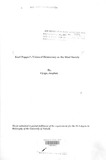Karl Popper's Vision of Democracy as the Ideal Society
Abstract
This work attempts to reveal and explicate Popper's Ideal Society. This is done against
the backdrop of an unended quest, by social philosophers, for an Ideal Society. The study shows that unlike most past philosophers who envisaged the Ideal Society to be a utopian changeless and perfect entity, Popper conceives it as an imperfect, changing [growing] and Open Society. This Popperian Society is what the study has called Polyarchy - a term borrowed from Robert Dahl's A Preface to Democratic Theory and which symbolizes the epitome of the democratic process.The work recognizes Popper's contention that the classical conception of the Ideal Society was authoritarian and mistaken. It accepts his argument to the effect that this classical conception was prompted by a faulty epistemic theory. This theory takes the validity of knowledge to be a function of its sourc and therefore dependant on authority.It thus tends to justify might as being right. When moved to social and political philosophy, it leads to the question 'who should rule?' and therefore to the search for charismatic, intelligent, powerful and benevolent leaders. The study notices Popper's caution that if this line is taken then it degenerates into authoritarian rule and the propagation of the 'closed' Society.
In contrast to this, the study shows that Popper's 'open' Society is based on an objective
theory of knowledge. Here knowledge takes on a public outlook as emphasis is laid not
on the person or source but on debate and criticism. In this perspective, Knowledge is
never certain, it is perpetually hypothetical and conjectural. Since it is public, what is
crucial are the social institutions that protect the method of its acquisition. These
institutions also govern the conduct of the persons who proclaim this new knowledge.
The study then goes ahead to show that this conception of the problem of knowledge
leads, in social and political philosophy, to the question: How can we best control our
leaders? This results into the demand that a society be administered through social
institutions which protect the freedom of its members. These institutions should be
controlled by the public as they themselves know what is best for them.
Although the mood that permeates through the whole work is of shared assumptions, the study challenges many of Poppers' convictions. It takes great exception to his reduction of epistemology to just methodology, his rejection of psychologism and personalism and especially his demand for near pure institutionalism. It disagrees with his belief in the rationality and objectivity of man especially when it comes to politics. It also rejects his assumption of the autonomy of the Open Society. In this process, it develops Popper's ideas further by arguing that falsification alone is not enough in the search for knowledge. It also shows that institutionalism when it disregards the personal factor cannot be a foundation of an Ideal Society.But in the end the study adopts most of Popper's ideas and hopes that, because of their heuristic value, they will be embraced by leaders, particularly in strife tom regions of Africa, and where authoritarian regimes persist.
Citation
Masters of Arts Degree in PhilosophyPublisher
University of Nairobi Department of Arts Philosophy
Description
Thesis submitted in partial fulfilment of the requirements for the Masters of Arts Degree in Philosophy of the University of Nairobi.

